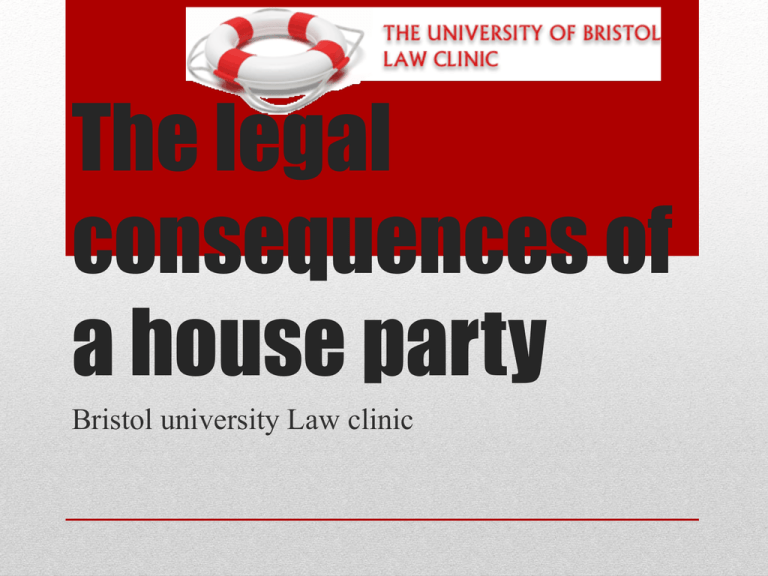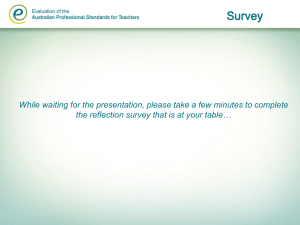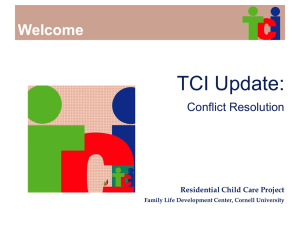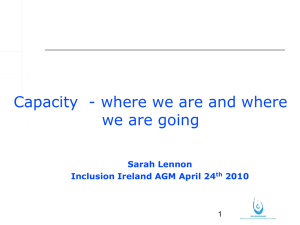
The legal
consequences of
a house party
Bristol university Law clinic
Drugs, Alcohol
and Theft
The consequences of a house party
What happened?
• Is it illegal to drink while underage or merely sell/distribute/serve
alcohol?
• Should the shopkeeper be criminally responsible for selling
alcohol to Sergio?
• What if Sergio presented a fake ID and looked over 18?
• Is it illegal to take drugs, or merely sell or distribute them?
• Is cannabis any more harmful than cigarettes or alcohol?
• Should the drug be outlawed? – If so, is the law being consistent
by banning cannabis while allowing cigarettes and alcohol?
What do you think?
What are the issues?
• Under the Misuse of Drugs Act
1971 it is an offence to:
•
•
•
•
Possess a controlled substance unlawfully
Possess a controlled substance with intent to supply
Supply or offer to supply a controlled drug (even if it is free)
Allow a house, flat or office to be used by people taking
drugs
• If you are found in possession of
Cannabis (class B drug) - you could
face up to 5 years in prison or an unlimited
fine or both
• If you are found to be dealing
Cannabis – you can face up to 14 years in
prison or an unlimited fine
Drugs
• If you are under 18 – it is against the
law:
• For someone to sell you alcohol (Janet is
criminally responsible)
• To buy or try to buy alcohol (Sergio)
• For an adult to buy or try to buy alcohol for you
• To drink alcohol in licensed premises (e.g. a pub
or restaurant)
• Fake ID? – it is an offence to use fake
ID
Alcohol
• Has Charlie stolen from his sister, even though he
planned to return the money?
• Theft Act 1968
•
•
S.1 A person is guilty of theft if he dishonestly appropriates
property belonging to another with the intention of permanently
depriving the other of it; and “thief” and “steal” shall be
construed accordingly.
S.2 It is immaterial whether the appropriation is made with a
view to gain, or is made for the thief’s own benefit.
Theft
The Drunken
Assault
•
•
•
•
Charlie is angry that Sergio refuses him cannabis
They are rather drunk and confrontational
Sergio pushes Charlie and Charlie
punches him in the face
Sergio trips on loose floorboard
and stumbles unconscious
to the floor
Battery and bodily harm
• If Sergio suffers superficial cuts or minor injuries,
he would responsible for battery
• Maximum jail sentence 6 months
• If injuries more serious, Charlie
could be charged for assault
causing bodily harm
• Maximum jail penalty of 5 years
Self Defence
• Charlie may try to rely on self defence to justify punching
• Can be used if from Sergio’s perspective he feared being
attacked
• But defence not available here because
of Charlie voluntarily intoxicated himself
Don’t get Drunk-Period
• Annie is a qualified first aider
• She knows unconscious people
should be sent to hospital
• But she does nothing because
she does not like Sergio
The Observer
Omission to Act
• Law does not criminalize omission to act
• Law does not want to enforce morality
• But a person must act if he
created the dangerous situation,
like in R v Miller
• Annie would have been guilty if
she incited the fight or cheered them on
Just sit back
• Sergio may want to sue Janet’s
parents for not taking care to fix
their floorboard
• Janet’s parents had forbidden her to
invite guests into the house
due to the floorboard
The Loose Floorboard
Occupier’s liability
• Occupier owes duty of care to take care
of visitors on his premises
• A house can have many occupiers if
they exert legal control over it. Janet
and her parents are jointly and severally
liable
• Visitor is someone who owner has
allowed expressly or impliedly to enter
his house
• Breached reasonable standard expected
of owner in maintaining his house
Intoxication and Gatecrashing
• In a recent case against Plymouth City Council,
court ruled that claimant was contributory
negligent
• Owner cannot guard against unreasonable
behaviour of drunken person
crossing field at night
• However, owners owe duty to trespassers
if owner appreciates substantial risk
or danger
Ground your teenage daughters
Or just repair the damn floorboard
already!
Key Lessons For Parents
SEX
•
In 2010 there were 6,674 teen pregnancies in
the UK. One of the highest rates in Europe!
• Study by the World Health Organisation in 2008 found that
more children are having sex in Britain that in any other country
in Europe!
• 20 teenage girls fall pregnant everyday.
• Four out of ten girl in England have underage sex.
• 34% of teenage boys in Britain have underage sex.
• And more than 15% of these teenagers fail to use contraception.
SEX
• Age of Consent in England and Wales = 16
• This is the same for boys and girls, and for heterosexual
and homosexual sex.
• Is underage sex a criminal offence?
• Underage sex will be viewed as a sexual assault:
• A boy over 16 who has sex with a girl who he knows to be
under 16 will be breaking the law, even if she agrees to
sex.
• A girl over 16 who has sex with a boy under 16 may also
be prosecuted for sexual assault.
• Where someone under 18 has sex with someone under 16, there is
a maximum sentence of 5 YEARS IMPRISONMENT.
Any form of sexual activity between someone over 16 and
someone under 16 is a criminal offence, even if they consent.
• What if both people are under 16?
Even if they are consenting, if both parties
know that the other is under 16 then they will
both technically be guilty of an offence.
• Having sex with someone who is under 13 raises even
more possibilities for prosecution:
• Specific offences protecting children under 13. Children under 13
cannot legally given their consent to any form of sexual activity.
• Maximum sentence: life imprisonment.
• No defence of mistaken belief about age
WHAT IS CONSENT?
Consent means that both people in a sexual encounter
must agree to it, and either person may decide at any
time that they no longer consent and want to stop the
activity.
A person consents if he or she agrees by choice, and
has the freedom and capacity to make that choice.
Consenting to one sort of sexual activity does not
obligate you to consent to any other sexual
activity.
Consenting on one occasion also does not obligate you
to consent on any other occasion.
Consenting means only that at this particular time,
you would like to engage in this particular sexual
behaviour
Can someone under 16 consent to sex?
• Whilst someone under 16 might agree to sex and say
that they want to have sex, this does not meant that
they consent to sex in the eyes of the law.
• Sex with any girl or boy under 16 is illegal, even if
they give permission.
CONSENT TO SEX WHILST
DRUNK
To give consent to sex, a person must have
capacity to give consent.
This relates to their awareness, knowledge and
understanding of the situation which they are
consenting to.
Capacity and Intoxication
If a person is drunk and temporarily loses her capacity
to choose whether to have sex, she is not consenting –
and this may amount to rape.
If a person is drunk but still
remains capable of choosing
whether to have sex,
despite being drunk,
then they can give consent
– and this will not be rape.
Sexually Transmitted Diseases
If you knowingly infect someone with an STI, you may be
liable for an assault causing actual or grievous bodily harm.
Les Pringle,
convicted October
2012
POLICE POWERS
Eventually the party becomes so noisy that the
police are called. The police arrive and attempt to
close down the party. Charlie, who is, by now, very
drunk, swears loudly at the policemen. The
policemen invite him outside and then arrest him
for being found drunk in a public place. Charlie’s
friend, Andrew goes out to see what is going on.
He argues with the police. The police decide to
search Andrew. They discover a pocket knife on
him and arrest him for possession of a weapon.
Andrew is taken to the police station and
questioned.
Swearing at a police
officer
• Is it illegal to swear in public?
• Section 5 Public Order Act 1986 makes it illegal to
“Use threatening, abusive or insulting words or
behaviour… within the hearing or sight of a person
likely to be caused harassment, alarm or distress
thereby”
Being found drunk in a public
place
• Is this an offence?
-Section 12 Criminal Justice and Police Act 2001 makes alcohol
consumption in designated public places an offence
-Section 91 Criminal Justice Act 1967 being drunk and
disorderly in a public place
• Does it matter that the police took him outside?
Winzar v Chief Constable of Kent
Stop and Search
• Police and Criminal Evidence Act Part 1
“reasonable suspicion”
• Terrorism Act 2000
Over 100,000 stop and searches, no
arrests for terrorism offences made
• Black people are over seven times more likely to be stopped
and searched. Why is this?
Knife offences
• Section 1 Prevention of Crime Act 1953 makes it an offence to
carry offensive weapons in public places without lawful
authority or reasonable excuse.
• Andrew must prove there was a reasonable excuse for him
having the pocket knife e.g. religious reasons, use at work, part
of a national costume
• Section 139 (3) Criminal Justice Act 1988 says this only
applies to pocket knives if the blade exceeds 3 inches – this
may depend on whether the knife has a locking blade
Questioning at a police station
• The caution:
"You do not have to say anything but it may harm your
defence if you do not mention when questioned
something which you later rely on in Court. Anything
you do say may be given in evidence."
• You have a right to legal advice (Part 5 section 58
PACE)
• When would you remain silent?
Passage:
The next morning, Janet is worried she may have picked up an STD, and
also wants to do a pregnancy test. She goes to her local clinic and arranges
an appointment with Dr. Ryan. The pregnancy test comes back negative.
However, Janet tests positive for chlamydia. Dr. Ryan recommends
treatment, but Janet is very distressed refuses treatment because she is afraid
her parents might find the medication and discover her condition. However,
she asks for contraceptive pills so that she can remain sexually active
without the risk of getting pregnant. Her irrational activity leads Dr. Ryan to
become concerned about her psychological well-being, and he wants to
contact her parents. He is also concerned that she intends to engage in
further sexual activity without treating her chlamydia first.
Can Dr. Ryan contact Janet’s parents, even if this means disclosing entrusted
information - such as Janet’s sexual activity and her medical condition?
Can Dr. Ryan provide Janet with contraceptive pills without her parent’s
knowledge?
Can Dr. Ryan force Janet to undergo treatment for her chlamydia?
Can Dr. Ryan warn Janet’s potential sexual partners about her
condition?
What if Janet was diagnosed not with a curable infection like chlamydia,
but with an incurable and deadly disease such as HIV?
Can Dr. Ryan contact Janet’s parents, even if this means disclosing
entrusted information - such as Janet’s sexual activity and her medical
condition?
• Main issue here- doctor/patient confidentiality
• Doctors have a duty of confidentiality to both adults and children. This
means they can’t tell anyone about your health, or pass on anything you
have said. But, there are some exceptions to this. The problem is, in the laws
eyes anyone under 18 is still considered a child and Janet is only 15.
• Dr. Ryan therefore has to assess her competency- if she is competent he
cannot tell her parents anything about her condition, if she's incompetent he
can. Doctors have special guidelines to test this. In Janet’s case, the fact that
the doctor is worried about her psychological condition means she probably
won’t be found competent, and he may well be able to tell her parents.
• Can Dr. Ryan provide Janet with contraceptive pills
without her parent’s knowledge?
• Since 2006 under-16s can receive contraceptive advice and
treatment without parental knowledge or consent. It is a basic
human right under Article 8 that you have a right to privacy.
This also applies to abortion. Medical advice and treatment can
be given on matters concerning contraception and sexually
transmitted diseases without parental consent and knowledge,
providing certain criteria is met- the same competency test as
above.
• Essentially, a doctor could refuse to give you the pill, but its
incredibly unlikely that they ever would!
Can Dr. Ryan force Janet to undergo treatment for her
chlamydia?
• Again the same issue that Janet is a child still arises (so can she
refuse treatment?)
• Dr. Ryan himself cannot force Janet to do anything at all.
However, if Janet is ‘competent’ then Dr. Ryan might feel he
has a duty to tell her parents.
• Whilst the law respects children’s autonomy it does not
necessarily mean they give them the same right as competent
adults to make foolish or irrational decisions. One thing the
law does not usually allow is for children to refuse treatment
• So a doctor can’t force anyone to have treatment, but if Janet
didn’t consent, and wasn’t held to be competent he may feel
under a duty to tell her parents so that they could consent on
her behalf.
Can Dr. Ryan warn Janet’s potential sexual partners
about her condition?
• Doctors are not allowed to disclose information on
patients unless there is a real risk of serious harm. In this
case chlamydia is not fatal, therefore he Dr. Ryan would
not be able to tell her sexual partners anything. However
he would strongly advise Janet to tell any partners of her
condition.
What if Janet was diagnosed not with a curable infection like
chlamydia, but with an incurable and deadly disease such as HIV?
• This would mean Janet is putting others at substantial risk.
• Whatever age you are, it is illegal to have sex with people if you have
HIV and you don’t tell them! It doesn’t matter whether you deliberately
transmit it to somebody or if you just don’t tell them and hope for the
best, it is a criminal offence and you would be charged with GBH. But
what about Dr. Ryan? Can he tell anyone?
• The answer is probably not. But there is a chance that if he knew Janet
was planning on having unprotected sex with someone and not telling
them, he may be able to tell the person. However, first of all he would
have to try and convince Janet herself to tell them and then get
permission from several bodies that he was making the right decision in
disclosing her disease. If doctors told everyone the minute someone was
diagnosed with HIV then nobody would ever go to the doctors!
• Therefore in all cases, a doctor must try and convince Janet herself to tell
any sexual partners that she has HIV before sleeping with them.
However, if they feel that someone is in danger they may tell them of her
condition.










